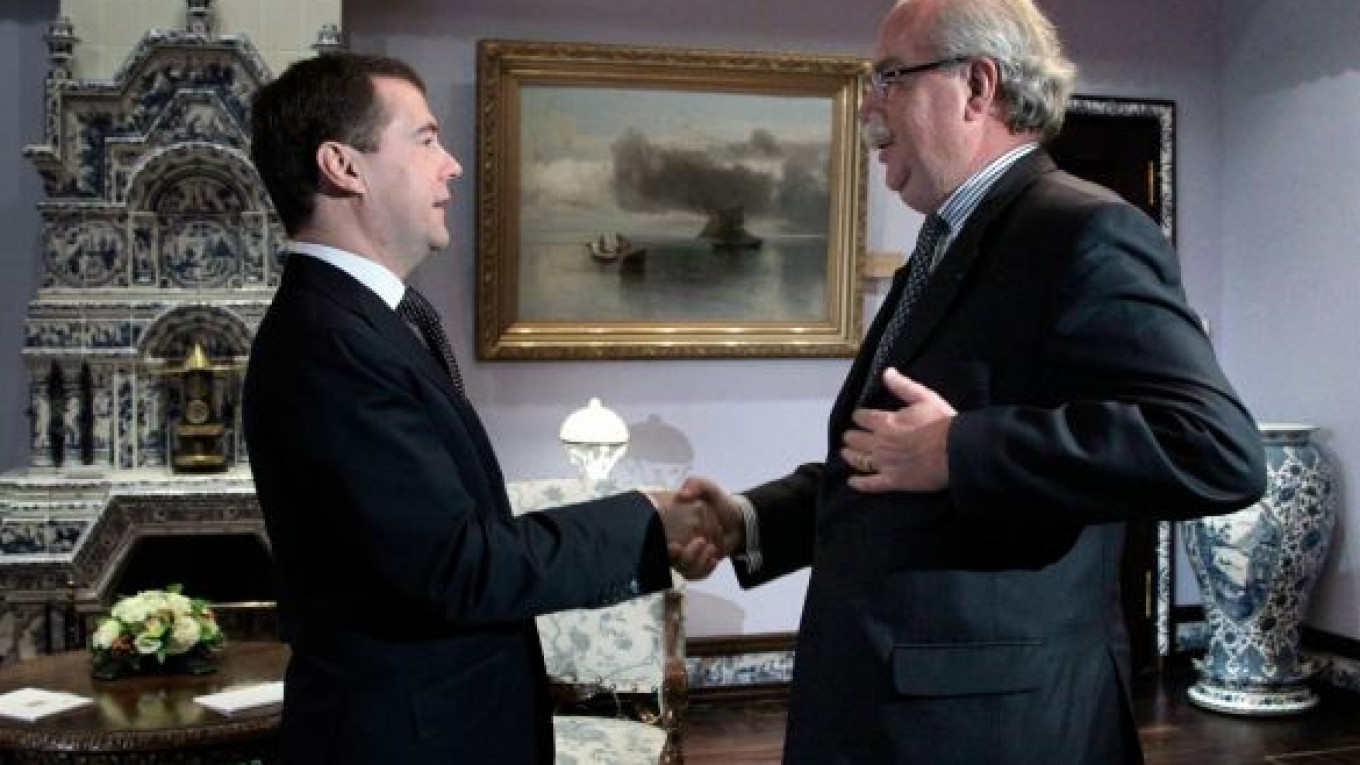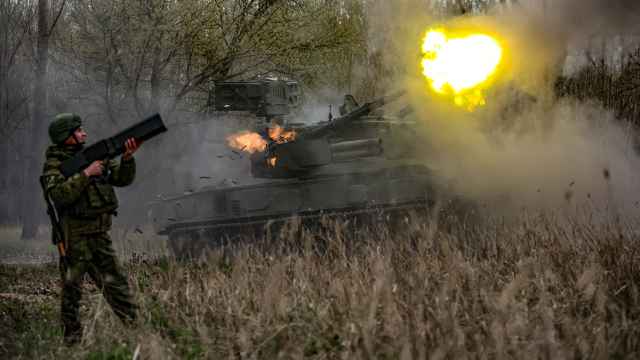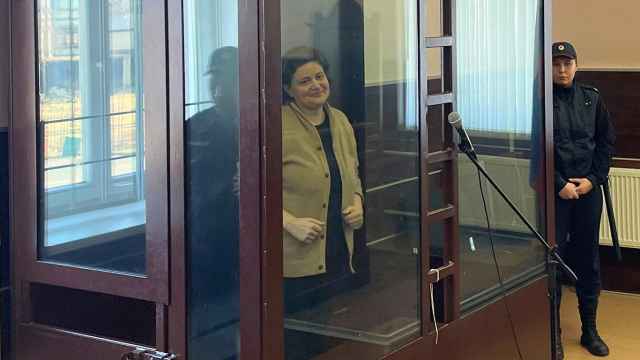Cisco Systems chief executive John Chambers must have made quite the impression when he met President Dmitry Medvedev at the St. Petersburg International Economic Forum last year.
Just three days after the forum ended, Medvedev visited the headquarters of the communication systems giant in San Jose, California, as part of a tour of Silicon Valley.
But Chambers' meeting with Medvedev in San Jose also came at a price — $1 billion. During their second meeting, Chambers pledged to invest $1 billion in Russian modernization and technological innovation, a pet project of the president.
Cisco, of course, expects its investment to pay off big for its shareholders. Part of the money, for example, will be spent on IT education initiatives unveiled this week that Cisco hopes will encourage Russians to use more technology — and, in turn, place more orders with Cisco.
"If the market increases, our market share also grows," Cisco spokesman Alexander Palladin said.
Chief executives vie to meet Medvedev and Prime Minister Vladimir Putin because getting noticed by the country's two most powerful men can lead to large contracts, change legislation and ease bureaucratic hurdles, company executives said.
"It might … be … useful to meet them, get their blessing," said the former chief executive of a large multinational company who said he ran a successful business without ever meeting Putin or Medvedev.
"In doing that, possibly all other bodies underneath these two gentlemen switch on their 'green light,'" said the former executive, who, like one other foreigner interviewed for this article, requested anonymity to avoid jeopardizing relations with the government.
The "green light" can lead to a flood of orders. After Putin endorsed Boeing's presence in Russia in 2009, the planemaker signed a $3.7 billion deal with state-owned Russian Technologies. Aeroflot announced orders for so many Boeing aircraft that Putin chided the airline for not purchasing enough domestically built planes earlier this year.
Putin and Medvedev regularly see chief executives and other directors from large companies, foreign and Russian. Industry leaders such as Siemens, Goldman Sachs, Ford, IBM and Intel, which are involved in economic or social development projects on a national scale, dominate the list of companies that the two leaders have contact with.
Officially, to get in touch with Putin or Medvedev, a company's chief executive or president should write a letter, in Russian, requesting the meeting and offering clear reasons for it to take place, according to Putin's spokesman, Dmitry Peskov, and business executives. The letter should then be sent to the minister who oversees the field that the company works in, and it is the minister's responsibility to forward it to Putin or Medvedev. The process takes about three months, company executives said.
To make sure that the request finds its way to the desk of Putin or Medvedev, the company needs to make contacts in the ministries, Peskov said. Putin responds to 100 percent of inquiries, he said.
Naturally, those contacts take time and major effort.
When Delovaya Rossiya, the small and medium-sized business association, was just forming five years ago, its representatives attended numerous conferences, including those held by United Russia, made long phone calls and held seemingly endless negotiations in order to make contact with ministers, Delovaya Rossiya vice president Nikolai Ostarkov said.
The efforts paid off. Now Medvedev and Putin speak at its forums.
Opportunities to meet with the leaders come at least once a year — with Medvedev at the St. Petersburg forum in June, and with Putin at the Sochi investment forum in October, business executives said.
Getting in touch with Putin and Medvedev is also possible through their official web sites (government.ru or kremlin.ru, respectively) and other online media.
Medvedev has a Facebook page and a Twitter account. It is not clear what his response rate is, but at least one blogger's Twitter message was answered.
The blogger posted on Medvedev's Twitter page that he was asked for $300,000 when he requested a meeting with Medvedev's first deputy chief of staff, Vladislav Surkov, in February.
"I showed your tweet to Surkov. Call his office. Tell him who is trying to extract money," Medvedev answered.
While government officials deny that meetings involve requests for money, news reports and public opinion say otherwise.
Paying for meetings with government officials is so prevalent that the service has an unofficial name, "vneseniye v grafik," or "getting on the schedule," said Stanislav Belkovsky, a one-time Kremlin insider.
A variation on this service is to arrange to sit next to the government official at public events or to fly on their plane, he said, adding that the price goes up if there are photos. Regional businessmen seeking to boost the prestige of their companies are the most likely customers.
Putin's spokesman denied any such service. "It's total nonsense," Peskov said. "It doesn't exist."
But IKEA's first director in Russia, Lennart Dahlgren, was told by a high-ranking official that it would cost $5 million to $10 million to arrange a meeting between his boss, Ingvar Kamprad, and Putin in 2005, Dahlgren wrote in his book "IKEA Loves Russia: A Story of Leadership, Passion and Perseverance."
An appointment with First Deputy Prime Minister Igor Shuvalov costs $150,000, The New Times reported in February, citing government sources.
Shuvalov's press secretary, Andrei Machevsky, vehemently denied the report in a telephone interview and said any misconduct would be immediately investigated and officials who requested money would be severely punished.
"You know the movie 'Saw'?" Machevsky asked, referring to the 2004 slasher film. "This would seem mild," Machevsky said.
If arranging a meeting with Putin and Medvedev proves difficult, find a friendly lower official and move up the ladder, said Viktor Sedov, president of the U.S.-Russia Center for Entrepreneurship, a small business development organization.
Another way a chief executive can get noticed is by donating a significant amount of money, for example $1 million, to a government fund such as the Save the Tiger Fund, said the former chief executive of the multinational company.
If an international company invests here, it also can apply for membership via the Foreign Investment Advisory Council, or FIAC, a council of executive officers, directors and presidents from 42 international Fortune 500 companies that advises Putin on business development.
Sometimes Putin and Medvedev initiate meetings with chief executives, like when Medvedev invited Total chief executive Christophe Margerie in March to sign a cooperation agreement with Novatek. But companies themselves should expect to do the courting.
"Heads of state of Eastern and Central European countries — but also from other emerging markets — get on a plane and visit a CEO to convince him to invest in their country," the former chief executive said. "A CEO in front of Mr. Putin or Mr. Medvedev might not get the same eager vibes."
A word of caution: if a chief executive has a meeting with Putin, he had better show up.
Metals company Mechel lost more than $5 billion in share value after its managing director and main owner, Igor Zyuzin, skipped a meeting that Putin invited him to attend in July 2008. Zyuzin instead sent word that he wasn't feeling well.
An irate Putin promised to send "a doctor" together with investigators and anti-monopoly officials to review Mechel's pricing policies, causing the company's shares to tumble nearly 40 percent. Last year, Putin expressed regret over his comments.
Mechel declined to comment for this article.
Clear communication is a must to avoid awkward situations. During a June 2005 meeting, Robert Kraft, owner of the New England Patriots football team, handed Putin his diamond-encrusted 2005 Super Bowl ring, which the prime minister tried on, put in his pocket and left with.
The incident led to media speculation that Putin had stolen the ring, prompting Kraft to confirm several days later that he had meant to give it to Putin. The ring is now in the Kremlin library.
Perhaps one of the main benefits of a meeting is the promise of quick results from a government notorious for bureaucracy.
"You can object to something, to discuss an issue," said Ostarkov, of Delovaya Rossiya.
After Delovaya Rossiya met with Putin last October, the prime minister issued 17 different orders to ministries concerning Delovaya Rossiya suggestions on investment in the regions, taxes and an organization to protect companies from racketeering, among other things.
In April, penalties for economic crimes were softened after Delovaya Rossiya asked that business owners who face charges receive protection from losing their companies until a court decision is reached. Medvedev proposed the bill to the State Duma following a meeting with the association.
Business associations like Delovaya Rossiya, Opora and the Russian Union of Industrialists and Entrepreneurs secure the much-desired meetings because they work with the government, opposition leader and former Deputy Prime Minister Boris Nemtsov said.
Russian companies not affiliated with the government don't have the same privilege unless they are run by billionaires whose business activities have a significant impact on the national economy and generate large tax revenues for the government, he said.
"They are blood brothers," Nemtsov said of the billionaires and Putin. "They are a gang that rules over business."
But business insiders said the process of securing meetings with leaders, as well as the meetings themselves, has become professional.
Requests for money in exchange for meetings with Putin and Medvedev are unlikely because they would create a scandal amid Medvedev's increased efforts to combat corruption, said a business insider who has used his government connections to set up meetings between international companies and Putin and Medvedev.
The insider, who has frequently visited Russia since the 1980s and lived permanently here for about a decade, said the meetings are always bribe-free and he only offers his help if the company wants to offer a viable proposal to modernize the economy.
Contrary to popular belief, the days of huge deals negotiated in the banya over shots of vodka are long gone. Meetings now take place in offices or conference halls, where both sides painstakingly prepare their talking points, said Mikhail Dvorkovich, head of the Novoye Delo business association.
"It's become much more civilized," Dvorkovich said.
A Message from The Moscow Times:
Dear readers,
We are facing unprecedented challenges. Russia's Prosecutor General's Office has designated The Moscow Times as an "undesirable" organization, criminalizing our work and putting our staff at risk of prosecution. This follows our earlier unjust labeling as a "foreign agent."
These actions are direct attempts to silence independent journalism in Russia. The authorities claim our work "discredits the decisions of the Russian leadership." We see things differently: we strive to provide accurate, unbiased reporting on Russia.
We, the journalists of The Moscow Times, refuse to be silenced. But to continue our work, we need your help.
Your support, no matter how small, makes a world of difference. If you can, please support us monthly starting from just $2. It's quick to set up, and every contribution makes a significant impact.
By supporting The Moscow Times, you're defending open, independent journalism in the face of repression. Thank you for standing with us.
Remind me later.






